| Artist |
The Cure |
| Album Title: |
Songs of a Lost World |
| Album Cover: |
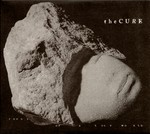 |
| Primary Genre |
Rock: Goth Rock |
| Format |
CD (2) Blu-Ray |
| Released |
11/01/2024 |
| Label |
Polydor |
| Catalog No |
7503679 |
| Bar Code No |
6 02475 03679 1 |
| Packaging |
Cardboard 8 Panel Gatefold |
| Tracks |
| Songs of a Lost World (Disc 1) |
| 1.
|
Alone (6:50)
|
| 2.
|
And Nothing is Forever (6:53)
|
| 3.
|
A Fragile Thing (4:43)
|
| 4.
|
Warsong (4:17)
|
| 5.
|
Drone: Nodrone (4:45)
|
| 6.
|
I Can Never Say Goodbye (6:03)
|
| 7.
|
All I Ever am (5:21)
|
| 8.
|
Endsong (10:25)
|
|
| Songs of a Lost World (Instrumental) (Disc 2) |
| 1.
|
Alone (6:50)
|
| 2.
|
And Nothing is Forever (6:53)
|
| 3.
|
A Fragile Thing (4:43)
|
| 4.
|
Warsong (4:17)
|
| 5.
|
Drone: Nodrone (4:45)
|
| 6.
|
I Can Never Say Goodbye (6:03)
|
| 7.
|
All I Ever am (5:21)
|
| 8.
|
Endsong (10:25)
|
|
| Songs of a Lost World (Blu-Ray) (Disc 3) |
| 1.
|
Alone (6:50)
|
| 2.
|
And Nothing is Forever (6:53)
|
| 3.
|
A Fragile Thing (4:43)
|
| 4.
|
Warsong (4:17)
|
| 5.
|
Drone: Nodrone (4:45)
|
| 6.
|
I Can Never Say Goodbye (6:03)
|
| 7.
|
All I Ever am (5:21)
|
| 8.
|
Endsong (10:25)
|
|
| Date Acquired |
01/14/2025 |
| Personal Rating |
 |
| Acquired from |
1-2-3-4 Go! Records, LLC |
| Purchase Price |
28.99 |
Web Links |
All Music Guide Entry:
Discogs Entry:
MusicBrainz Entry:
Pitchfork Review:
Wikipedia Entry: |
Notes |
Notes:
Released in an eight panel digisleeve with 16 page lyrics and credits booklet, booklet includes lyrics for "Bodiam Sky" which was dropped from the album, and originally intended as the album closer.
Sticker on the front reads 'Deluxe Edition' and detailed info, on the back reads 'Made In Germany'.
On digisleeve:
A Polydor Records release. ℗ & © 2024 Lost Music Limited under exclusive licence to Universal Music Operations Limited.
Made in the EU. Universal International Music B.V.
Blu-ray:
Immersive mix and immersive master at Abbey Road Studios.
Stereo master at Metropolis Studios.
The credits booklet includes the last six lines of poem "When I Have Fears That I May Cease To Be" by John Keats. Last page of booklet has catalogue number 7503679 in top left corner.
Credits:
Artwork [Art], Design – Andy Vella
Assemblage ["Bagatelle" Sculpted By] – Janez Pirnat
Bass – Simon Gallup
Drums, Percussion – Jason Cooper
Guitar – Reeves Gabrels
Keyboards – Roger O'Donnell
Mastered By – Matt Colton
Mastered By [Immersive Master By] – Oli Morgan (tracks: BD-1 to BD-8)
Mastered By [Stereo Master By] – Matt Colton (tracks: BD-1 to BD-8)
Mixed By [Immersive Mix By] – Oli Morgan (tracks: BD-1 to BD-8), Robert Smith (tracks: BD-1 to BD-8)
Performer [All Songs Performed By] – The Cure
Producer, Mixed By – Paul Corkett, Robert Smith
Recorded By – Paul Corkett
Recorded By [Assisted By] – Bunny Lake, Jack Boston, Joe Jones (5), RS
Sleeve [Sleeve Concept], Photography By [Pictures Of Stone] – RS
Songwriter [All Songs Written By] – Robert Smith
Voice, Guitar, 6-String Bass, Keyboards – Robert Smith
Companies, Etc.:
Phonographic Copyright ℗ – Lost Music Limited
Copyright © – Lost Music Limited
Licensed To – Universal Music Operations Ltd.
Record Company – Universal International Music B.V.
Recorded At – Rockfield Studios
Produced At – Lostworld Studios
Mixed At – Lostworld Studios
Mixed At – Abbey Road Studios
Mastered At – Metropolis Studios
Mastered At – Abbey Road Studios
Manufactured By – Optimal Media GmbH – AO23517
Manufactured By – Optimal Media GmbH – AO23518
Manufactured By – Optimal Media GmbH – EO23519
Manufactured By – Optimal Media GmbH – EO26628
Record Company – Polydor Records
Barcode and other Identifiers:
Barcode (Text): 6 02475 03679 1
Barcode (Scanned, UPC-A): 602475036791
Label Code: LC 00309
Rights Society: BIEM/SDRM
Other (CD1 cat#): 7503674
Other (CD2 cat#): 7515717
Other (BD cat#): 7513339
Matrix / Runout (CD1, variant 1): [Universal logo] 7503674 [Universal logo] AO23517-01 manufactured by optimal media GmbH
Mastering SID Code (CD1, variant 1): IFPI L578
Mould SID Code (CD1, variant 1): IFPI 9712
Matrix / Runout (CD2, variant 1): [Universal logo] 7515717 [Universal logo] AO23518-01 manufactured by optimal media GmbH
Mastering SID Code (CD2, variant 1): IFPI L578
Mould SID Code (CD2, variant 1): IFPI 9723
Matrix / Runout (BD, variant 1): EO23519-01 7513339 manufactured by optimal media GmbH
Mastering SID Code (BD, variant 1): IFPI L579
Mould SID Code (BD, variant 1, mirrored): IFPI 9756
----------------------------------------------------------------------------------------------
Analyzed Folder: The Cure - Songs Of A Lost World - Disc 1_dr.txt
----------------------------------------------------------------------------------------------
DR Peak RMS Filename
----------------------------------------------------------------------------------------------
DR5 -0.30 dB -6.76 dB 01 - Alone.aif
DR6 -0.30 dB -8.31 dB 02 - And Nothing Is Forever.aif
DR6 -0.30 dB -7.51 dB 03 - A Fragile Thing.aif
DR5 -0.30 dB -6.86 dB 04 - Warsong.aif
DR6 -0.30 dB -7.13 dB 05 - Drone;Nodrone.aif
DR5 -0.30 dB -7.25 dB 06 - I Can Never Say Goodbye.aif
DR4 -0.30 dB -5.97 dB 07 - All I Ever Am.aif
DR5 -0.30 dB -6.36 dB 08 - Endsong.aif
----------------------------------------------------------------------------------------------
Number of Files: 8
Official DR Value: DR5
----------------------------------------------------------------------------------------------
----------------------------------------------------------------------------------------------
Analyzed Folder: The Cure - Songs Of A Lost World - Disc 2_dr.txt
----------------------------------------------------------------------------------------------
DR Peak RMS Filename
----------------------------------------------------------------------------------------------
DR6 -0.30 dB -7.00 dB 01 - Alone (instrumental).aif
DR6 -0.30 dB -8.61 dB 02 - And Nothing Is Forever (instrumental).aif
DR6 -0.30 dB -8.02 dB 03 - A Fragile Thing (instrumental).aif
DR5 -0.30 dB -7.19 dB 04 - Warsong (instrumental).aif
DR6 -0.30 dB -7.54 dB 05 - Drone;Nodrone (instrumental).aif
DR5 -0.30 dB -7.44 dB 06 - I Can Never Say Goodbye (instrumental).aif
DR4 -0.30 dB -6.09 dB 07 - All I Ever Am (instrumental).aif
DR5 -0.30 dB -6.45 dB 08 - Endsong (instrumental).aif
----------------------------------------------------------------------------------------------
Number of Files: 8
Official DR Value: DR5
----------------------------------------------------------------------------------------------
|
|
| Reviews |
All Music Guide Review by Fred Thomas:
Songs of a Lost World, the 14th studio album from the Cure, might just be unprecedented. The statistical circumstances surrounding the album are unique: this is the first completely new material from an indescribably influential band in 16 years, arriving about five years after it was initially scheduled, and after the group had been regularly playing some of the songs at their consistently popular concerts for years. It's not the typical release schedule, even for a legacy act, but somewhere in the history of rock music there might be an exact analog. What really makes Songs of a Lost World atypical is how great it is. The eight songs that make up the album aspire to and often reach the same slow-moving grandeur of the Cure's high-water mark album, 1989's Disintegration, only without any of the playful pop that snuck into that record and propelled the band's biggest singles. Themes of loss, isolation, impermanence, and mortality are all translated into Robert Smith's signature melodic melancholia, all of it delivered in deep, drawn-out, sweeping movements. The nearly seven-minute opener "Alone" sets the pace, with dense swirls of synths, simple, pounding drums, and the kind of lengthy building intro that the band perfected on some of their best songs. It's a solid three minutes before Smith starts singing, but the arrangement has forgotten about time by that point, creating an atmosphere that's hard not to get lost in. This atmosphere sustains for the album's duration. There are some spikes in energy like the tormented grooving of "Drone Nodrone" or the cinematic drive of "All I Ever Am," but even these outbursts don't stray too far from the concentrated whole that the album presents. The general path SoaLW takes is consistent throughout, whether manifesting as the creaky pump organ chords that begin the aching "Warsong" or the bittersweet collision of auburn-hued string arrangements and crunchy alt-rock guitars on "And Nothing Is Forever." Closer "Endsong" takes its time hammering the album's overarching feeling home with a ten-minute runtime that echoes peak moments of slow, sad beauty from the group's decorated past. This is the first Cure album written and arranged solely by Smith since 1985's The Head on the Door, and there's a similar color to the solitude he explores here. It's a win against slim odds that the band would make a solid, listenable album almost 50 years in, and with almost 20 of those passing since their last new set of songs. Songs of a Lost World isn't just an album of unlikely listenability, though. It's a new chapter late in the game so unexpectedly powerful that it's nothing short of stunning, and just as unexpectedly, it ranks among the band's best work.
Pitchfork Review by Ben Cardew:
Have the Cure ever been truly young? Even as teenagers in England’s punk era, there was something suspiciously adult about this darkly elegant band from Crawley, who favored introspective Saturday nights at home, listening to dripping taps while keeping their tear ducts firmly buttoned up.
Perhaps this is why maturity suits the band so well. It has been 16 years (and two Kate Bush albums) since the last Cure LP and three decades since their last hit song. And yet Robert Smith & co. keep plodding on magnificently in a world of three-hour concerts, forever following their muse, free of the wearying obligations that face the next bright young things. Now, at last, they return with Songs of a Lost World, an album clearly uninterested in making up time after its prolonged gestation, and content to move at its own unhurried pace.
Of course, the Cure have had moments of giddy and joy over their four decades of life. But Songs of a Lost World has no gorgeously silly love songs like “The Lovecats”; no blood-pumping pop rushes like “Just Like Heaven”; no barrelling psychedelic jaunts like “The Caterpillar,” and no attempt to engage with the two billion-odd people born since the band last released an album. Nothing here—bar, perhaps, the riffy strut of “Drone:Nodrone,” a song of steely, gothic funk—raises the tempo beyond a stroll or threatens to push the temperature beyond a cold sweat. Instead, the Cure sound deliciously slow, elegantly weary, and definitively grown up on their 14th studio album.
Songs of a Lost World may be going nowhere fast, but that doesn’t mean it’s going nowhere. “Alone,” the opening song, is an object lesson in the way rock music can age gracefully. Reeves Gabrels’ gloriously jagged guitar pulls at the hair of Jason Cooper’s stadium drum thump while ethereal keyboard lines keep gentle watch. It’s an epic, thunderclouds-over-the-mountaintop production that shuns the callous energy of youth in favor of sober reflection, wrapped up in a beautifully pensive chord progression. When Robert Smith finally steps to the mic, three minutes in, and proclaims, “This is the end/Of every song that we sing,” it feels apocalyptically right, like the odd comfort of having your worst fear realized.
The droney, Nico-esque intro of “Warsong” aside, you’d be hard pressed to spot many moments where the Cure push themselves musically. Simon Gallup’s bass lines are uniformly tough and low slung, bringing the same rugged drive he has delivered on and off since 1979; Cooper’s drums have the juddering, tom-led intensity of Lol Tolhurst’s work on Pornography; and the ghostly synth melodies on “Alone” and “Endsong” suggest the magical melancholia of “All Cats Are Grey,” from 1981’s Faith. Gabrels, the new boy of the band, with only 12 years of service, comes closest to breaking new ground, although his feedback and fuzz on “Warsong” and the tortured wah-wah on “Drone:Nodrone” inevitably remind the listener how much the shoegaze bands borrowed from the Cure in the first place.
Unlike, say, the Rolling Stones in 2024, today’s Cure don’t profess any need to prove their vitality or relevance. And why should they? It sometimes feels like we all eventually become the Cure, as the band’s eternal—and initially precocious—preoccupations about mortality, aging, and doubt inevitably drip into our lives as we get older and frailer. And if we are to bend to the Cure, then why should the Cure bend to us? The band has carved out its own sound—gothic, epic, and yet strangely minimal—and earned the right to remain there. Songs of a Lost World feels thick and important, a giant oak tree of an album that towers over everything it surveys. Every element counts—every plucked bass string, rolling drum fill, angry guitar strum, or gentle piano note feels vital.
Songs of a Lost World may not be a vast step up in quality from the highlights of Bloodflowers, 4:13 Dream, or whatever your favorite is of the band’s post-Wish records. (Opinions vary wildly.) But it feels like a record whose time is right, delivering a concentrated dose of the Cure and cutting the fat that dogged their later albums. The album’s eight songs bring sharply potent tales of death (“I Can Never Say Goodbye” is about the unexpected passing of Smith’s older brother Richard); mortality (the beautiful “And Nothing Is Forever”); and the difficulty of being in the present moment (“All I Ever Am”). Smith’s voice is still a remarkable instrument of release after all these years, and his best couplets (“And the birds, falling out of our skies/And the words, falling out of our minds,” from “Alone”) remain marvels of economy and craft.
Songs of a Lost World feels at times like David Bowie’s own great reflection on mortality, Blackstar, although the Cure take few of the stylistic risks that he did. Much as in Bowie’s later years, it has often felt like a new Cure album would never arrive, the band’s momentum fatally stalled by the indecision of the 2000s. But perhaps the greatest compliment to pay Songs of a Lost World is that it already feels inevitable, a work of wisdom and grace that extends naturally from the moment the Cure took up their instruments in a local church hall all those years ago.
|
|
| Cover 1 |
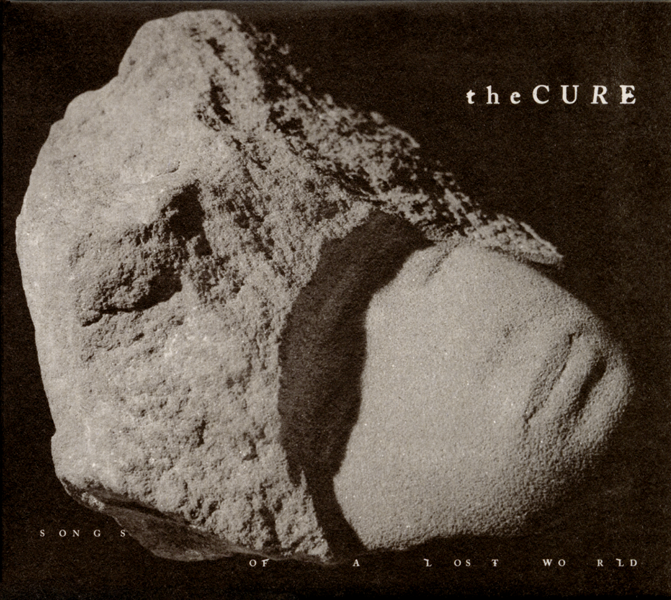 |
| Cover 2 |
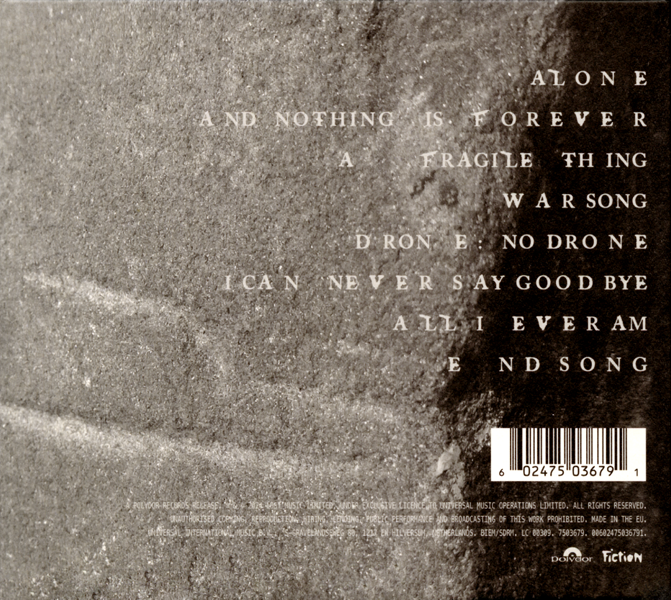 |
| Cover 3 |
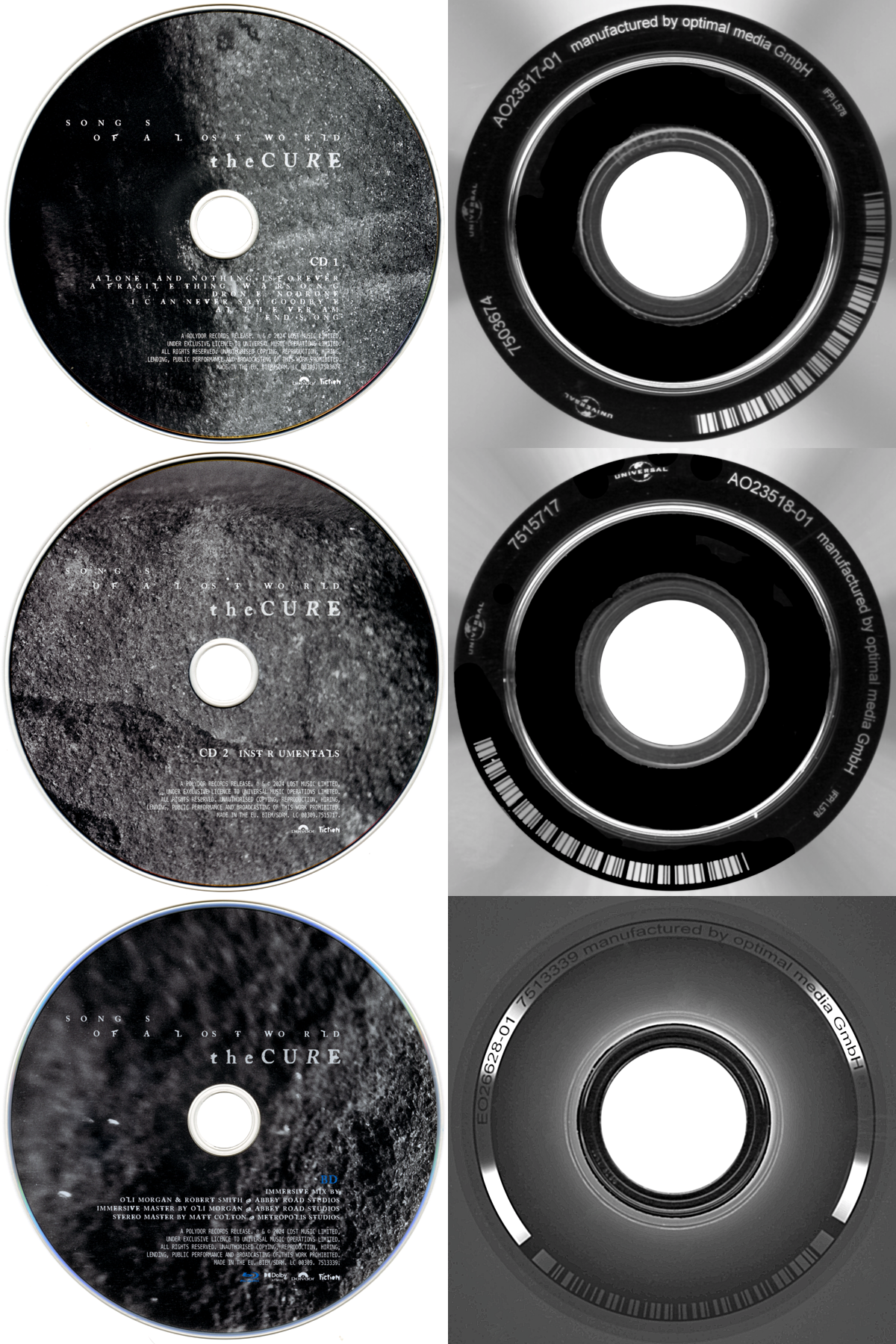 |
| Cover 4 |
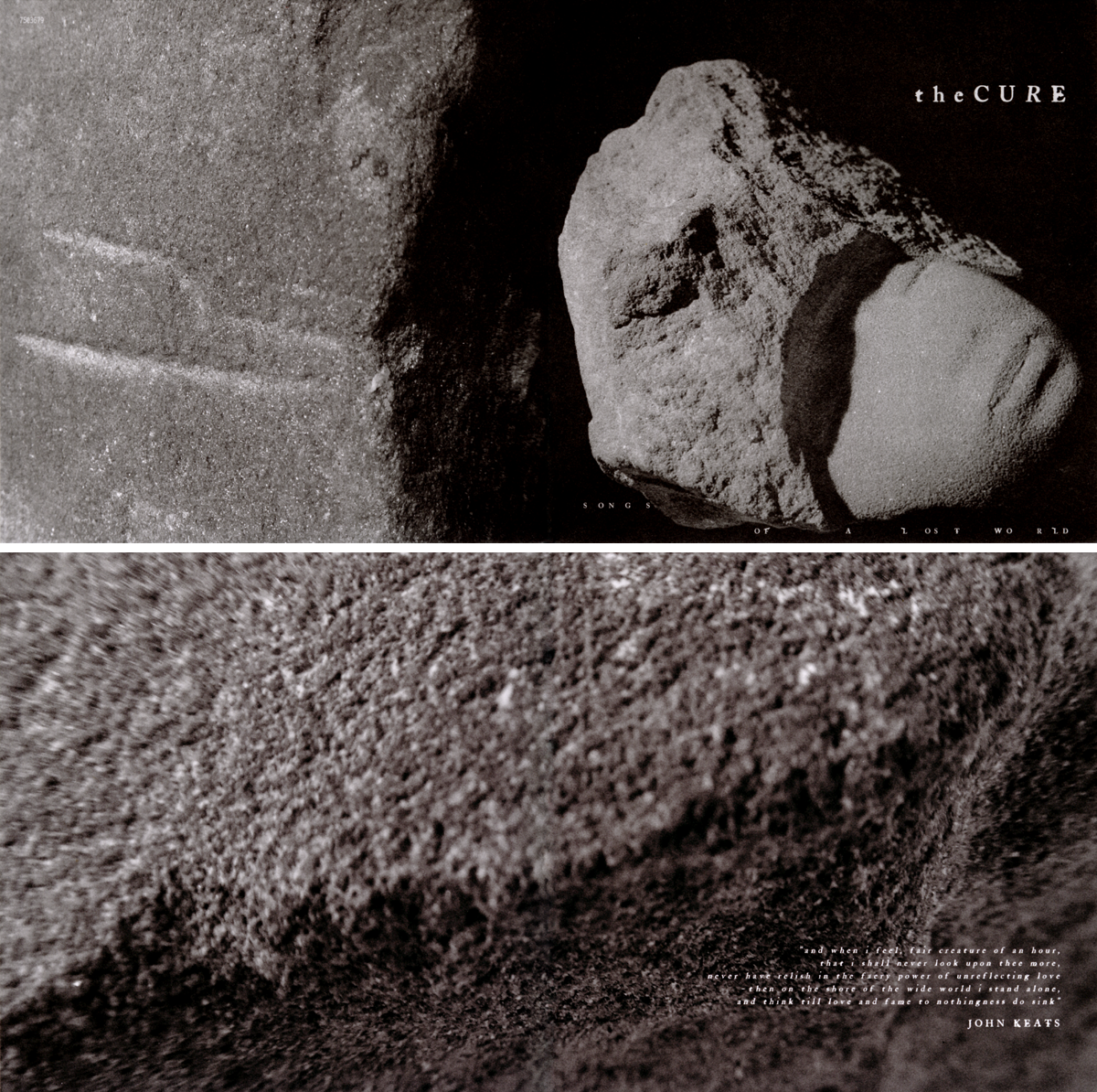 |
| Cover 5 |
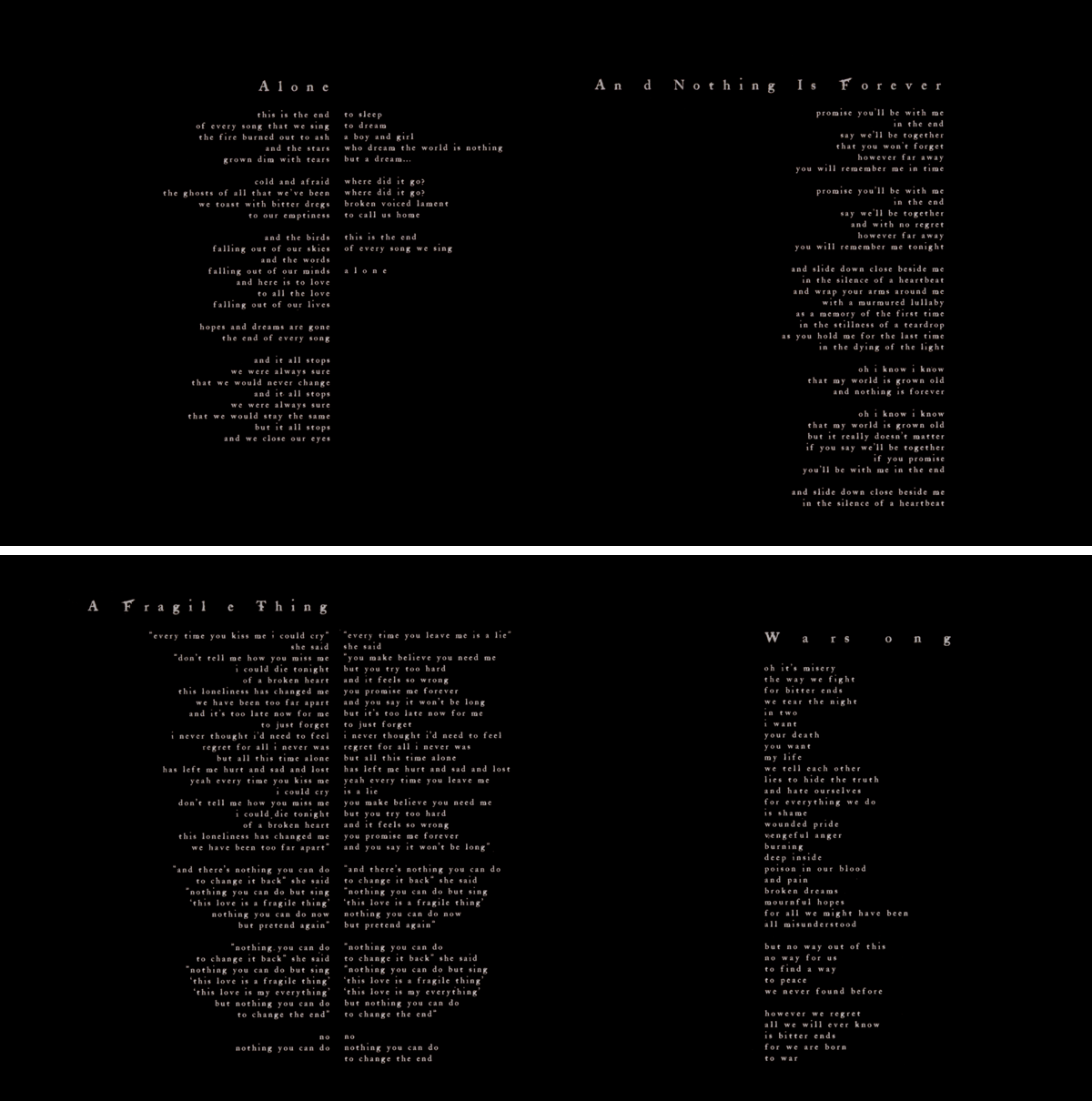 |
| Cover 6 |
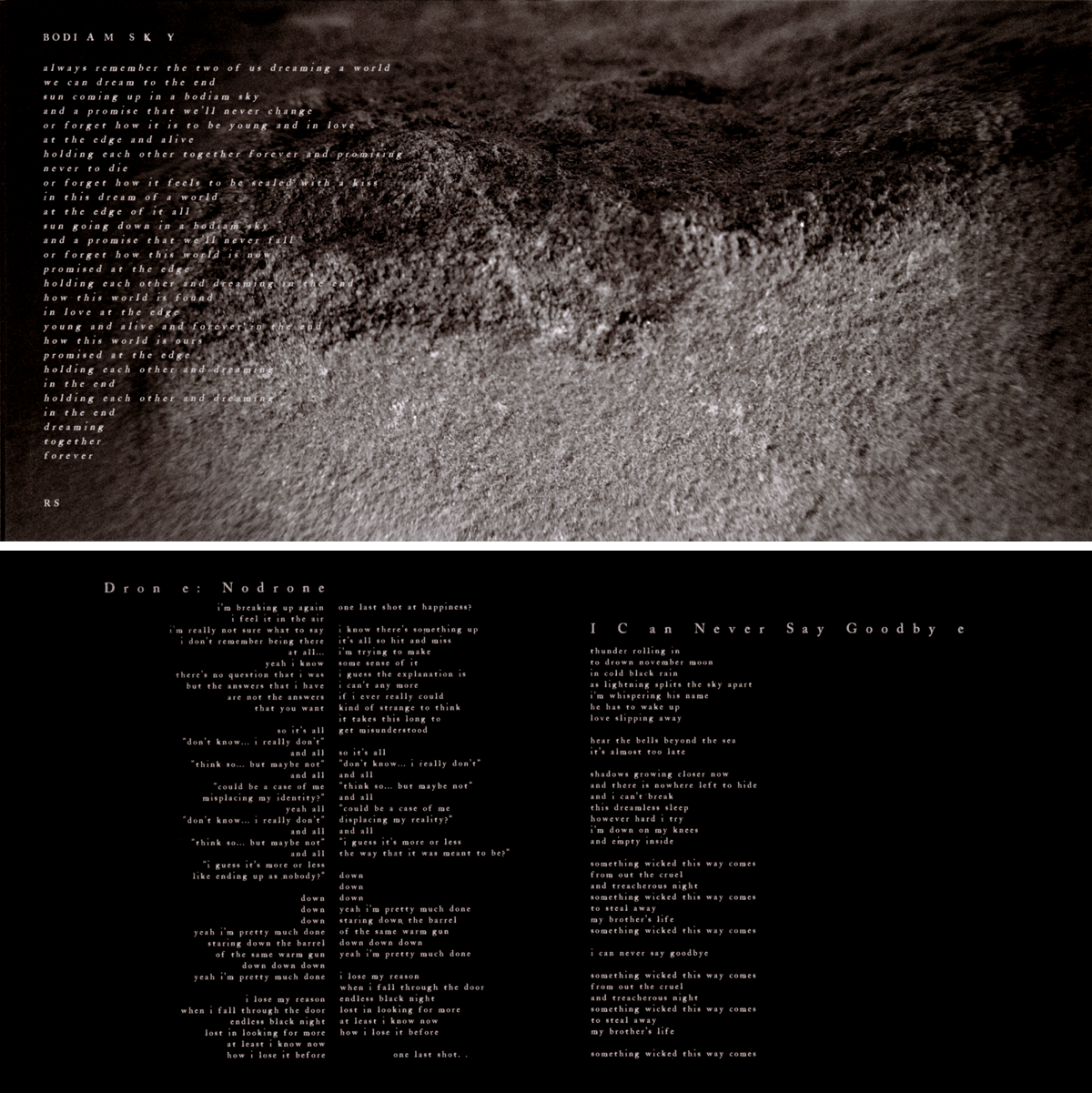 |
| Cover 7 |
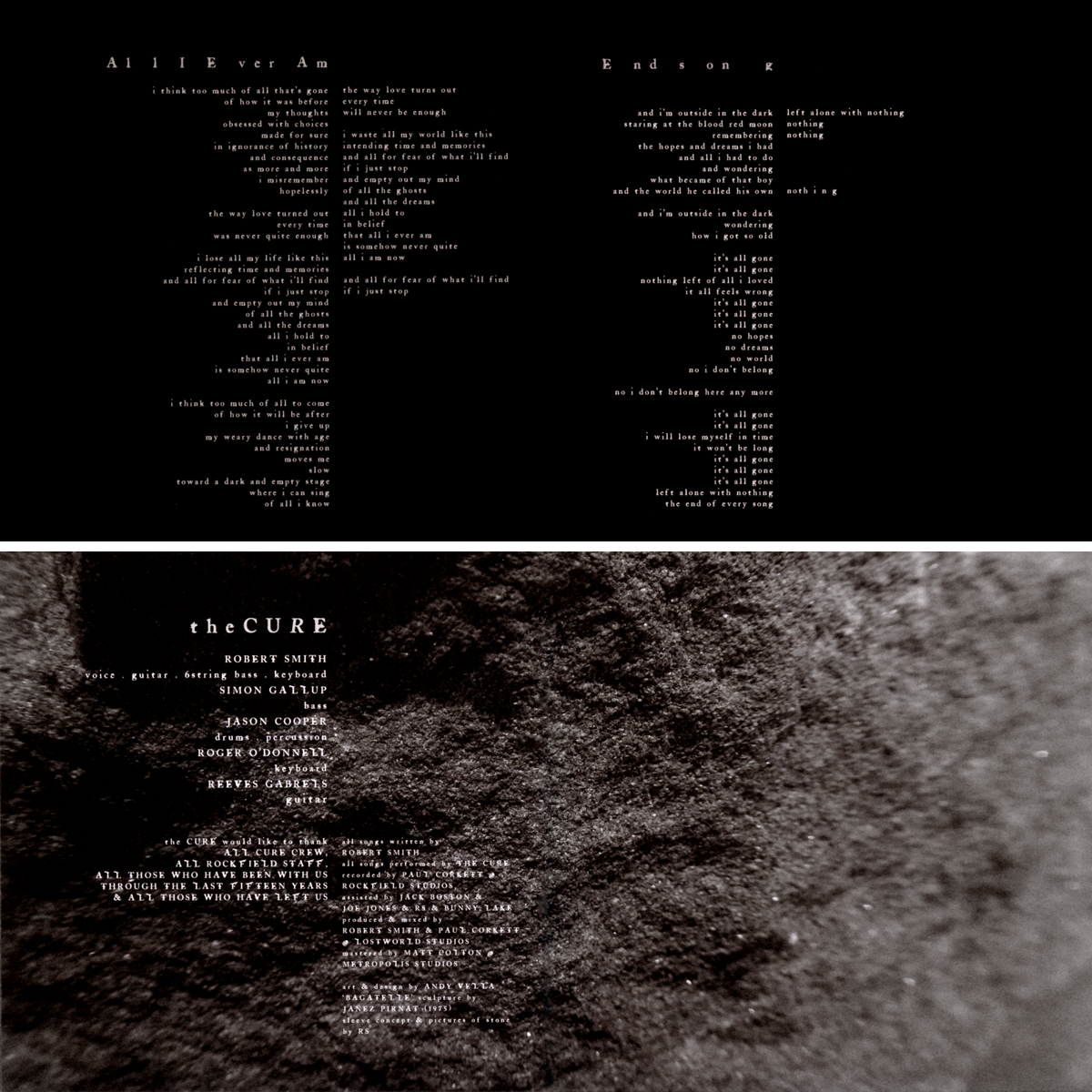 |
| Cover 8 |
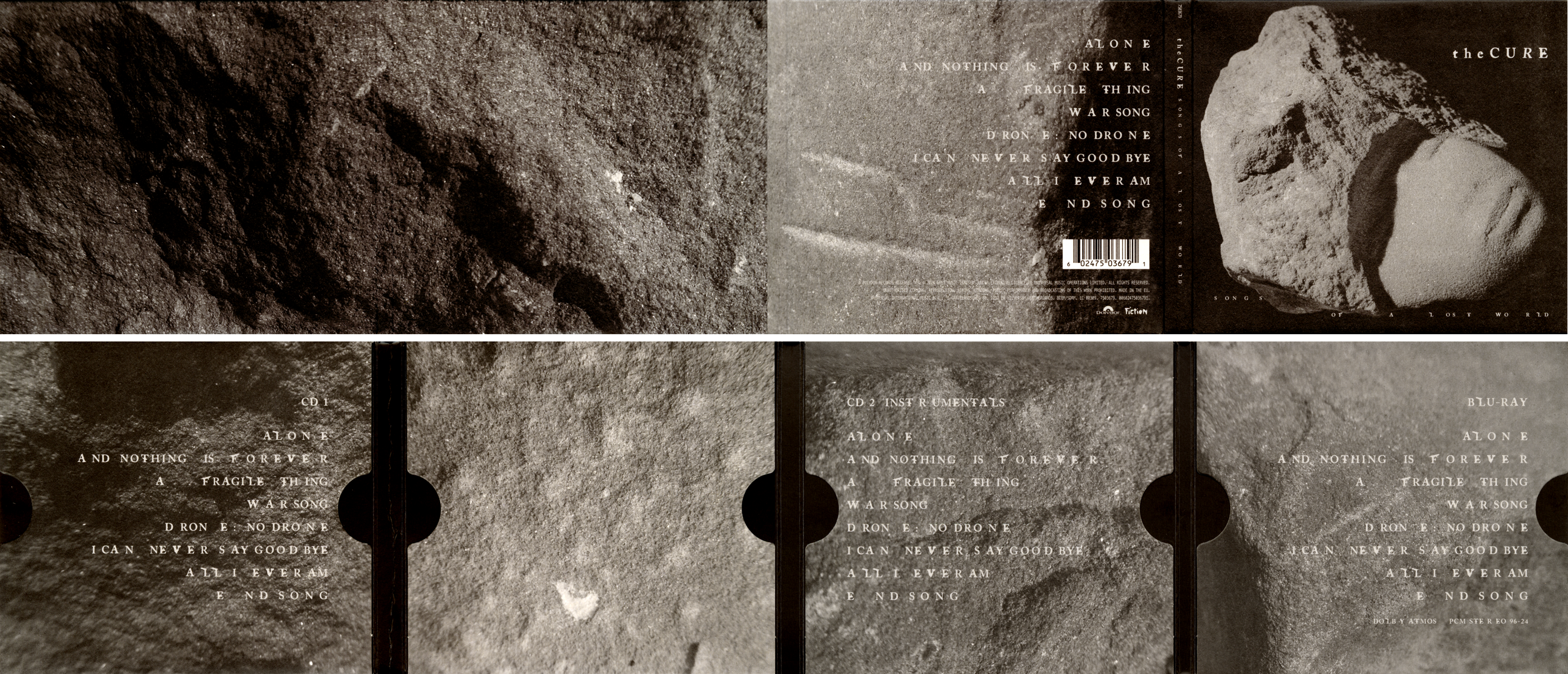 |
| Cover 9 |
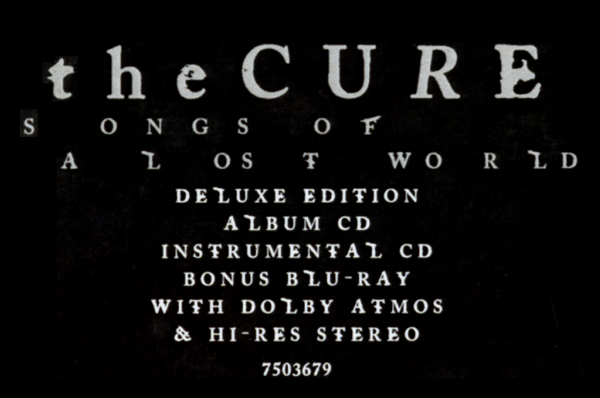 |
|











